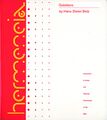Category:Pauline Studies--1970s
1977 : Paul and Palestinian Judaism, by Ed Parish Sanders
Ed Parish Sanders, Paul and Palestinian Judaism: A Comparison of Patterns of Religion (Philadelphia, PA: Fortress Press 1977; and London: SCM Press, 1977).
<Paul and Palestinian Judaism compares Judaism, understood on its own terms, with Paul, understood on his own terms. Sanders aims to: Consider methodologically how to compare two (or more) related but different religions destroy the view of Rabinic Judaism which is still prevalent in much, perhaps most, New Testament scholarship establish a different view of Rabbinic Judaism argue a case concerning Palestinian Judaism as a whole argue for a certain understanding of Paul carry out a comparison of Paul and Palestinian JudaismThis volume makes a contribution not only to the understanding of Paul and his relationship to Judaism, but also to the study of Judaism itself.>--Publisher description.
In this work Sanders seeks to compare, methodologically, two different systems of religion— namely Palestinian Judaism and Paul— on their own terms. His approach is to analyze the surviving literature for each respective religious system, draw conclusions based on a close reading of that literature, and then compare the two with one another. Throughout the comparative study, Sanders first debunks the predominant opinion of New Testament Scholars of his day that Judaism at the time of Jesus had degraded to a legalistic form of works-righteousness, and proposes instead, that Palestinian Judaism from 200 B.C.E. to 200 A.D. can be understand as “Covenantal Nomism.” After establishing this perspective, Sanders turns to Paul’s religious system and shows that, despite there being several points of convergence between Paul and Palestinian Judaism, since Paul denies the efficacy of the Jewish covenant for salvation he in essence rejects Covental Nomism. Thus Sanders concludes that Paul represents an entirely different form of religion that does not have a clear antecedent, but rather is a system that is focused on the meaning of the life and death of Jesus Christ. – Deborah Forger, University of Michigan
Pages in category "Pauline Studies--1970s"
The following 88 pages are in this category, out of 88 total.
1
- Paulus: Der Völkerapostel in jüdischer Sicht (1970 Ben-Chorin), book
- Paolo di Tarso (Paul of Tarsus / 1970 Garofalo), book
- Paulus: ein Entwurf seiner Theologie = Paul: Ontwerp van zijn theologie (Paul: An Outline of His Theology / 1970 Ridderbos / Pollmann), book (German ed.)
- Starotestamentowy kult ofiarniczy w liscie do hebrajczyków a w manuskryptach i dokumentach z Qumran (The Old Testament Sacrificial Cult in the Letter to the Hebrews and the Manuscripts and Documents from Qumran / 1970 Skwarczewski), book
- Philo and the Epistle to the Hebrews (1970 Williamson), book
- La Turchia greco-islamica di Paolo e di Giovanni (1971 Adinolfi), book
- Paul: apôtre de Jésus-Christ = Paulus (Paul / 1971 Bornkamm / Jeanneret), book (French ed.)
- The Sayings of Jesus in the Churches of Paul (1971 Dungan), book
- Perspectives on Paul = Paulinische Perspektiven (1971 Käsemann / Kohl), book (English ed.)
- (+) Colossians and Philemon (1971 Lohse / Poehlmann & Karris), book (English ed.)
- "And the Two Shall Become One Flesh": A Study of Traditions in Ephesians 5:21-33 (1971 Sampley), book
- Gnosticism in Corinth: An Investigation of the Letters to the Corinthians = Die Gnosis in Korinth: eine Untersuchung zu den Korintherbriefen (1971 @1956 Schmithals / Steely), book (English ed.)
- Barnabas: Restless Fighter (1971 Steen), novel
- Les écrits de Saint Paul: Lettres aux jeunes communautés (1972 Brunot), book
- To the Hebrews (1972 Buchanan), book
- The Soothsayer (1972 Chinn), novel
- Lettere pastorali (1972 Cipriani), book
- Énigmes de la deuxième épître de Paul aux Corinthiens (1972 Collange), book
- The Pastoral Epistles: A Commentary (1972 Dibelius, Conzelmann), book (English ed.)
- Paul, Envoy Extraordinary (1972 Muggeridge, Vidler), non-fiction
- Lettere dalla prigionia (1972 Peretto), book
- Paul & the Gnostics = Paulus und die Gnostiker (1972 @1965 Schmithals / Steely), book (English ed.)
- Forty Days Till Dawn (1972 Shrader), novel
- Untersuchungen zum zweiten Thessalonicherbrief (1972 Trilling), book
- The Meaning of Righteousness in Paul (1972 Ziesler), book
- St. Paul's Opponents and Their Background (1973 Gunther), book
- Rechtfertigung und Altes Testament bei Paulus (Justification and the Old Testament in Paul / 1973 Gyllenberg), book
- An die Römer (Commentary on Romans / 1973 Käsemann), book
- Lettere ai Corinzi (1973 Rossano), book
- Barnabas and Paul: Brothers in Conflict (1973 Steen), novel
- Paul the Traveller (1974 Bradford), book
- Paul and Jesus (1974 Bruce), book
- Paul's Intercessory Prayers (1974 Wiles), book
- The Letters to the Philippians, Colossians, and Thessalonians, rev. ed. (1975 Barclay), book
- 1 Corinthians: A Commentary (1975 Conzelmann / Leitch), book (English ed.)
- The Intermediary World and Patterns of Perfection in Philo and Hebrew (1975 Day), book
- Paul (1975 Drane), book
- Teología de San Pablo: síntesis y perspectivas (Pauline Theology: A Brief Sketch / 1975 Fitzmyer / Valiente Malla), book (Spanish ed.)
- The Gnostic Paul (1975 Pagels), book
- La Carta a los Gálatas = Der Brief and die Galater (The Letter to the Galatians / 1975 @1971 @1949 Schlier / Talavero Tovar), book (Spanish ed.)
- Paul and the Anatomy of Apostolic Authority (1975 Schütz), book
- Saint Paul Épître aux Romains (1975 Viard), book
- The Letters to the Galatians and Ephesians, rev. ed. (1976 Barclay), book
- Paul's Letters from Prison: Ephesians, Philippians, Colossians, Philemon (1976 Caird), book
- Eu, Paulo: vida e doutrina do apóstolo São Paulo (I, Paul: Life and Doctrine of St. Paul / 1976 Dattler), book (Portuguese)
- (+) Saint Paul (1976 Grant), book
- Paulus = Saint Paul (1978 Grant), book (German ed.)
- Soma in Biblical Theology, with Emphasis on Pauline Anthropology (1976 Gundry), book
- The Melchizedek Tradition (1976 Horton), book
- (+) I Corinthians (1976 Orr, Walther), book
- Lo spirito di Cristo (The Spirit of Christ / 1976 Penna), book
- Análisis exegético sobre la conversión de san Pablo: el problema teológico e histórico (1976 Sabugal), book
- La conversión de san Pablo: Damasco ¿ciudad de Siria o región de Qumrán? (1976 Sabugal), book
- Paolo: apostolo di Gesù Cristo = Paulus (Paul / 1977 Bornkamm / Comba), book (Italian ed.)
- Paulus = Paulus (Paul / 1977 Bornkamm / Rønnow), book (Norwegian ed.)
- El evangelio de Pablo: Esbozo de teología paulina (1977 Eichholz), book (Spanish ed.)
- Hebrews, James, 1 and 2 Peter, Jude, Revelation (1977 Fuller), edited volume
- A Commentary on the Epistle to the Hebrews (1977 Hughes), book
- Good News in Corinthians I & II (1977 Neil), book
- San Paolo (Saint Paul / 1977 Pasolini), non-fiction
- Paolo e gli arconti a Corinto (1977 Pesce), book
- Paul for a New Day (1977 Scroggs), book
- L'Épître aux Hébreux (1977 Spicq), book
- La lettera ai Romani (1977 Torti), book
- The Apostle Paul & Women in the Church (1977 Williams), book
- Pablo de Tarso = Paulus (Paul / 1978 @1969 Bornkamm / Sala, Vigil), book (Spanish ed.)
- Das Gesetz bei Paulus (Law in Paul's Thought / 1978 Hübner), book
- La Iglesia del Señor: Un estudio de eclesiología paulina (1978 Legido López), book
- Der Brief an die Galater (Galatians / 1978 Lührmann), book
- The Woman Who Loved Paul (1978 Neilson), novel
- Il mysterion paolino (The Pauline mysterion / 1978 Penna), book
- Struktura semantyczna neologizmów w listach sw. Pawla z Tarsu (Semantic Structure of Neologisms in the Letters of St. Paul of Tarsus / 1978 Popowski), book
- Ephesians, Colossians, 2 Thessalonians, the Pastoral Epistles (1978 Sampley), edited volume
- Der Jude Paulus und wir Heiden = Paul among Jews and Gentiles (1978 Stendahl), book (German ed.)
- The Moral Teaching of Paul (1979 Furnish), book
- The Influence of the Holy Spirit (1979 Gunkel / Harrisville & Quanbeck), book (English ed.)
- Paul--Crisis in Galatia: A Study in Early Christian Theology (1979 Howard), book
- Hebrews and Hermeneutics (1979 Hughes), book
- A Chronology of Paul's Life (1979 Jewett), book
- Paul and His Letters (1979 Keck), book
- Paulus im ältesten Christentum (Paul in Earliest Christianity / 1979 Lindemann), book
- 1 Corinthians (1979 Murphy-O'Connor), book
- Paulus und seine Mitarbeiter (Paul and His Staff / 1979 Ollrog), book
- Matrimonio e continenza nel cristianesimo delle origini: studio su 1Cor. 7,1-40 (1979 Prete), book
- 1 and 2 Thessalonians (1979 Reese), book
- Teologia swietego Pawla (Theology of St. Paul / 1979 Stepien), book
Media in category "Pauline Studies--1970s"
The following 12 files are in this category, out of 12 total.
- 1970 * Caldwell (novel).jpg 328 × 500; 37 KB
- 1971-T * Bornkamm en.jpg 900 × 1,387; 229 KB
- 1972 * Meeks.jpg 304 × 500; 49 KB
- 1972 * Rubenstein.jpg 300 × 450; 26 KB
- 1974 Barth.jpg 328 × 499; 39 KB
- 1975 Barclay.jpg 400 × 608; 40 KB
- 1975-T * Ridderbos en.jpg 800 × 1,187; 119 KB
- 1976 * Stendahl.jpg 324 × 499; 15 KB
- 1977 * Bruce.jpg 312 × 475; 30 KB
- 1977 * Sanders.jpg 321 × 499; 18 KB
- 1979 Betz.jpg 400 × 448; 152 KB
- 1979 Henderson (novel).jpg 300 × 300; 13 KB















